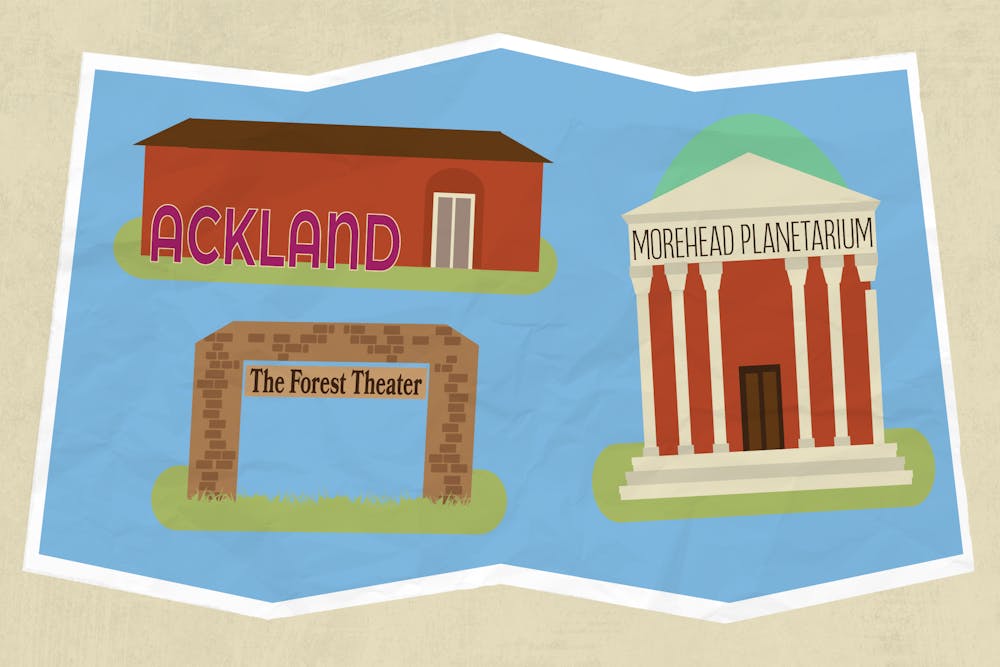Participants do not have to be students to walk The Black and Carolina Blue self-guided tour, offered through UNC Libraries.
"It was a process of selection," Nicholas Graham, a University archivist who helped create the tour, said. "It was also a process of demonstrating responsible history."
The Black and Carolina Blue tour focuses on African American history, taking people through important places on campus that demonstrate this history. For example, tourists go to the Old Chapel Hill Cemetery to learn about how notable Black and white University figures such as alumni and faculty members were buried in segregated plots. They also go to Carolina Hall, which was renamed in 2015 from Saunders Hall after 16 years of student protesting. South Building is another spot, which was built by 35 enslaved people and was the site of Civil Rights protesting in the 1960s.
Graham said any tour or exhibit that happens through Wilson Library’s resources are open to the public and accessible on their website.
Recently, Graham has helped with a digital exhibit on Pauli Murray — a queer Black lawyer with ties to the University — and an exhibit on women at UNC.
Off-campus tours
There are also various tours available off campus that focus on traditions, history and folklore.
The Chapel Hill/Orange County Visitors Bureau offers a self-guided walking tour of the murals and public art in Chapel Hill and Carrboro. Their map is free and accessible on their website.
The map also has interactive features, like QR codes that lead to informational sites about the artists, pieces of history or the subject of the mural. Between Chapel Hill and Carrboro, there are nearly 50 murals.
The Marian Cheek Jackson Center also offers a self-guided tour, Histories of Home: A Walk with Northside Neighbors, and is accompanied by a downloadable audio file and map. Community members narrate the tour as they tell stories, walk you through their struggles and share aspirations of their community — the Northside neighborhood.
While the audio file is free and accessible on their website, they encourage listeners to stop by the Center on West Rosemary Street to connect with staff. Physical copies of the audio and maps are also available at the Center.
Free Walking Tours of Chapel Hill is a 90-minute tour guided by Sally Smith. Groups start at Morehead Planetarium and then explore historic buildings, the sites of 1960s protests, outdoor murals and hidden gems of UNC and Chapel Hill. The tours will resume at the start of August.
To get the day's news and headlines in your inbox each morning, sign up for our email newsletters.
For a more mysterious and ambient, nighttime exploration of Chapel Hill, Triangle Walking Tours offers a Chapel Hill Ghost Walk and Chapel Hill True Crime tour. Triangle Walking Tours also offers a tour which explores the historic churches and architecture of Chapel Hill. All tours are $14 for an hour.
These tours are organized and occasionally led by Andrew Nason, a UNC alumnus. He said his process for developing tours starts with research and preparation. He then drafts a tour and will workshop them through a couple of actual tours to get community feedback.
Nason said this workshopping process helps him figure out what stops and information he provides is important, or what could be taken out to save time and energy.
“Kind of figuring it out from there,” Nason said. “What you believe would be the best potential experience to give someone a condensed view of the history and culture of a given town.”
The Heart of the Hill Tours is a project in collaboration with the Chapel Hill Historical Society and Chapel Hill/Orange County Visitors Bureau. The program is organized by Missy Julian-Fox, the daughter of the original owner of the iconic men’s clothing store, Julian’s, on Franklin Street.
Having grown up in Chapel Hill, Julian-Fox knew a lot about the town and the University's history, but as she got older she realized how many perspectives were missing from this history, she said. Since then, Julian-Fox has been dedicated to tours that provide diverse history.
No tour is the same, Julian-Fox said, as other volunteers have different stories that mean something to them.
“The beauty of the place, our traditions of the Old Well, what Franklin Street means to the community," she said. "All those are, I think, unique not just because we're a college town, but because of this history that we share and what we want to be about."
@dthlifestyle | lifestyle@dailytarheel.com



